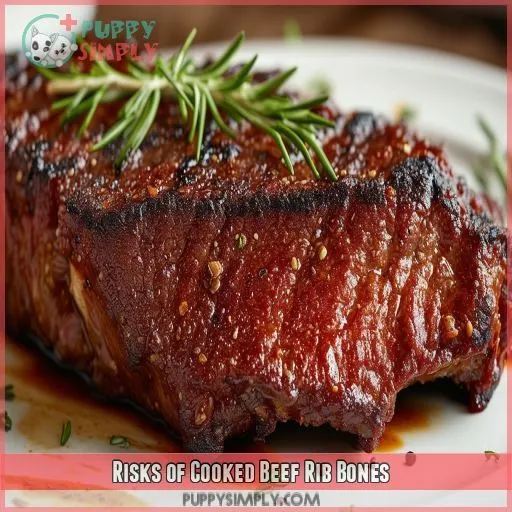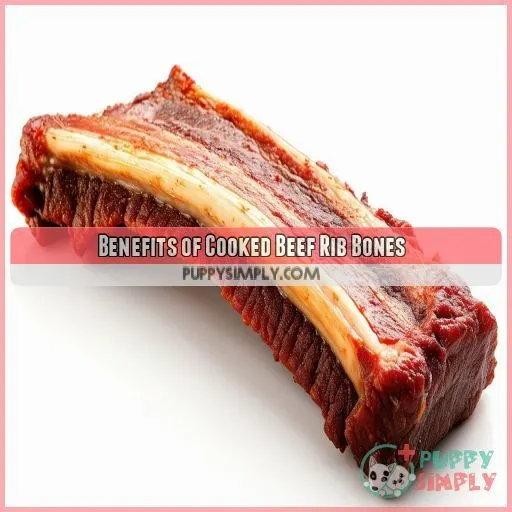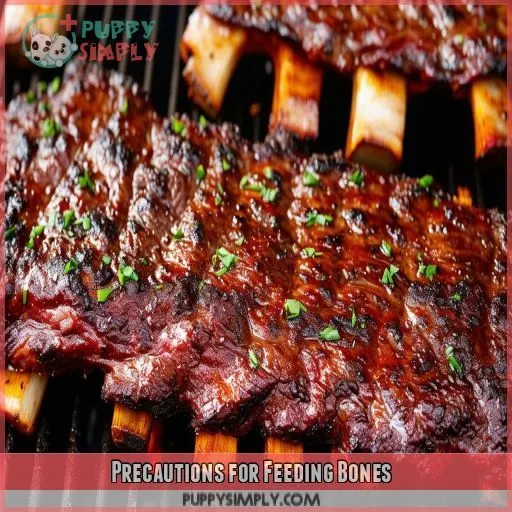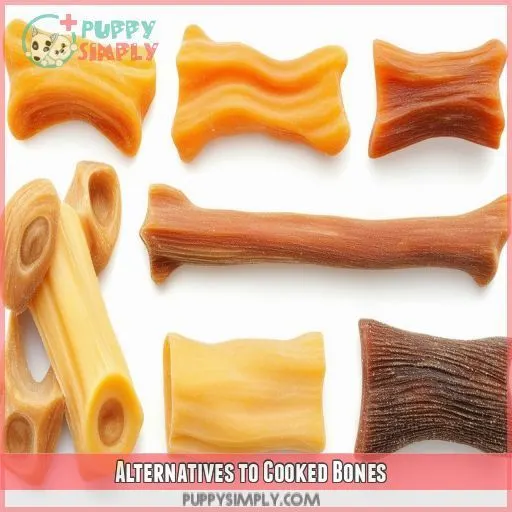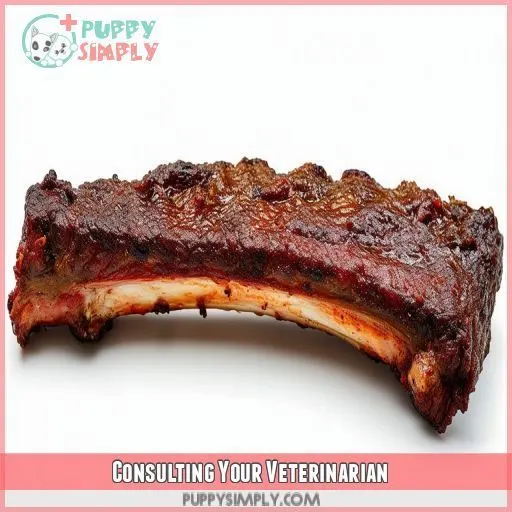This site is supported by our readers. We may earn a commission, at no cost to you, if you purchase through links.
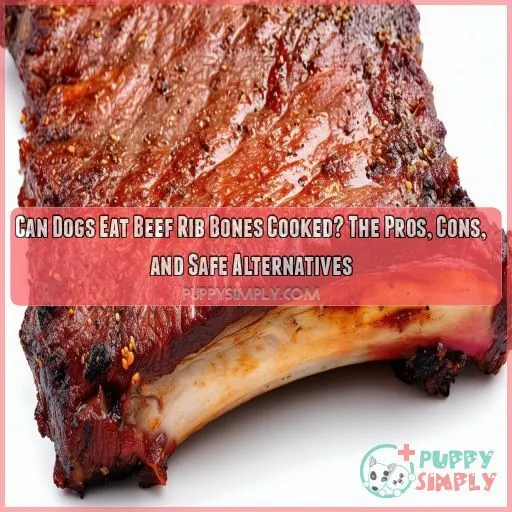
While they satisfy a dog’s natural chewing instincts and provide nutrients like calcium and protein, the risks outweigh the benefits.
Cooked bones can splinter, leading to punctures, choking hazards, or painful obstructions that may require surgery.
Instead, consider safer dental chews or interactive puzzle toys that offer similar benefits without the dangers.
Every pup is different – your furry friend’s breed, size, and dental health play a role.
For specific advice on alternatives that meet their specific needs, keep reading.
Table Of Contents
Key Takeaways
- Man’s best friend deserves better than a trip to the doggy ER. While cooked beef rib bones may seem like a tasty treat, they’re a shatter hazard that could leave Fido with some gnarly internal injuries. Trust me, you don’t want to be the one cleaning up that mess!
- Sure, those marrow-filled bones pack a nutritional punch, but there are safer ways to keep Rover’s tail wagging and teeth sparkling. Why not try some indestructible chew toys or dental treats designed specifically for our furry pals? They’ll get all the benefits without the bone-chillingly scary risks.
- When it comes to feeding time, moderation is key. Even if you do decide to toss your pup a cooked bone every once in a while, keep it to a minimum and never let them chow down unsupervised. A moment of distraction could turn into a costly trip to the doggy doc.
- At the end of the day, your vet knows best. They’ve seen it all – from the hilarious to the downright horrifying – so they’re the perfect resource for personalized advice on keeping your canine companion happy, healthy, and out of harm’s way when it comes to those tempting bones.
Can Dogs Eat Beef Rib Bones Cooked?
No, dogs shouldn’t eat cooked beef rib bones. Cooked bones can splinter and cause punctures, choking hazards, or digestive obstructions for dogs.
Risks of Cooked Beef Rib Bones
Cooked beef rib bones can be hazardous for dogs due to their tendency to splinter and create sharp fragments that may puncture the digestive tract. Additionally, these hard bones pose a significant choking risk and can lead to life-threatening blockages if swallowed whole or in large pieces.
Splintering and Punctures
Cooked beef rib bones can splinter into sharp shards, putting your pup at risk of punctures in their mouth, esophagus, or intestines.
Bone fragments from gnawing can lead to fractures, abscesses, or dental damage.
Veterinary experts recommend steering clear of cooked bones to prevent these painful, potentially life-threatening hazards.
For your dog’s safety, consider alternatives like durable chew toys or edible treats designed specifically for pets.
Choking Hazards
In addition to Splintering risks, cooked beef rib bones pose these choking hazards:
- Airway obstruction from bone fragments
- Esophageal damage from jagged edges
- Dental trauma from chewing hard bones
- Bone ingestion leading to intestinal blockages
Even supervised, never give cooked bones. Their brittle nature makes them potential choking and internal injury hazards for dogs.
Digestive Obstructions
Cooked beef rib bones can splinter and damage your dog’s digestive tract as they pass through. Bone fragments can tear or puncture the esophagus, stomach, or intestines, leading to internal bleeding, obstructions, and potentially life-threatening conditions like peritonitis or sepsis. Even small shards increase the risk of pancreatitis, an excruciating inflammation of the pancreas.
Benefits of Cooked Beef Rib Bones
Cooked beef rib bones can provide dogs with a natural source of nutrients like calcium, phosphorus, and protein that support overall health and bone strength. Additionally, chewing on these bones can help remove plaque and tartar from your dog’s teeth, promoting better dental hygiene and satisfying their innate urge to chew.
Natural Source of Nutrients
While cooked rib bones carry risks, they’re packed with nutrients that can benefit your dog’s health. The marrow and cartilage provide protein, vitamins, and minerals that support bone density and joint function. Chewing on rib bones can also help scrape tartar off teeth. However, moderation is key – rib bones shouldn’t replace a balanced diet.
Dental Hygiene
Chewing on cooked beef rib bones can help:
- Scrape away dental plaque
- Massage gums for better health
- Freshen breath by removing tartar buildup
While providing dental benefits, you must supervise to prevent tooth decay from bone shards lodging in teeth or causing other oral injuries.
Satisfies Chewing Instinct
Chewing cooked beef rib bones provides cognitive stimulation, satisfying your pup’s innate desire to gnaw. It promotes joint health through the motion and calcium intake from the bone marrow. Scraping dental plaque off their teeth keeps gums healthy. However, moderation is essential as excessive chewing risks splinters or digestive issues.
Precautions for Feeding Bones
You must supervise your dog closely when giving them cooked beef rib bones, as these bones can splinter and pose choking or digestive obstruction risks. Additionally, it’s essential to provide appropriately sized bones for your dog’s breed and age, and practice moderation to avoid overconsumption.
Supervision Required
You should never leave your dog unsupervised with cooked beef rib bones. Their density makes splintering a risk, which could lead to serious internal injuries if swallowed. Closely monitor chewing time and age/breed suitability. With proper training, supervised bone-chewing sessions can satisfy your pup’s natural urges safely.
Appropriate Bone Size
While supervising, verify the bone’s size matches your dog’s breed and jaw strength. Small breeds require smaller bones to prevent choking hazards, while larger dogs can handle denser bones. Consider:
- Bone marrow content
- Bone density
- Dental health needs
An appropriately-sized bone promotes safe chewing without splintering risks or excessive wear on teeth.
Moderation is Key
While cooked bones can benefit your pup’s dental health and provide nutrients, moderation is essential. Excessive consumption may lead to digestive issues or dental damage from shards. If you do offer cooked bones, keep portions small and supervise. Remember, dental chews and puzzle toys make great alternatives for satisfying that natural chewing urge safely.
Alternatives to Cooked Bones
You’ll want to explore safe alternatives to cooked beef rib bones that satisfy your dog’s natural chewing instincts without the risks. Dental chews, puzzle toys filled with treats, and raw bones (though controversial) can provide an outlet for chewing while mitigating potential hazards like splintering or obstruction.
Dental Chews
If cooked bones aren’t suitable, you can opt for dental chews. These synthetic bones offer a long-lasting chewing experience without the risks. Edible chews also provide a safer alternative, coming in various flavors and textures to satisfy your pup’s cravings. With a variety of options, you’ll find the perfect chew to keep those pearly whites clean.
Puzzle Toys
You can provide mental stimulation and enrichment through puzzle toys—interactive treat dispensers that engage your dog’s natural problem-solving abilities. These enrichment activities offer:
- Brain stimulation
- Cognitive benefits
- Mental exercise
- Boredom busters
Puzzle toys are safer alternatives to cooked bones, eliminating risk while satisfying your pup’s instinctual chewing needs.
Raw Bones (Controversial)
You might consider raw bones as an alternative, but they’re controversial. While the bone marrow provides nutrients and satisfies chewing instincts, raw bones carry risks like bacterial contamination and potential dental issues. Plus, there’s still a choking risk. If you go this route, supervise closely and consult your vet first.
Consulting Your Veterinarian
Consulting your veterinarian is essential for obtaining professional advice on whether cooked beef rib bones are appropriate for your dog’s diet and health condition. Your vet can assess the risks based on your dog’s age, size, and any existing dental or digestive issues, and provide personalized dietary recommendations.
Professional Advice
Before making any decisions, consult your veterinarian for professional advice on feeding bones. They can:
- Assess your dog’s dietary needs
- Evaluate potential risks based on breed, age, and health
- Recommend safe alternatives or guidelines
Your vet knows your pup’s unique needs and can provide customized guidance to ensure their safety and well-being.
Risk Assessment
You should consult your vet to assess the risks of feeding cooked bones based on your dog’s age, size, and dental health.
A vet can evaluate factors like bone density, marrow exposure, and cooking method to determine the potential for bacterial contamination or splintering.
This personalized risk assessment guarantees you make an informed decision about incorporating cooked bones safely into your pup’s diet.
Dietary Recommendations
After evaluating the risks, your veterinarian can suggest a well-balanced diet that incorporates bone marrow’s nutritional value while ensuring adequate:
- Calcium intake
- Dental health benefits
- Portion sizes for safe chewing habits
Their expertise guides you in safely fulfilling your dog’s innate cravings without compromising well-being. Trust their advice for your furry friend’s best nutrition.
Frequently Asked Questions (FAQs)
Are cooked beef rib bones digestible for dogs?
A shocking 1 in 4 vets see bone fracture cases weekly. Cooked beef rib bones, though not digestible for dogs, splinter dangerously causing internal punctures. Play it safe – avoid these altogether for your pup’s well-being.
How often should dogs be given cooked bones?
Cooked bones should only be an occasional treat for dogs. Too many can lead to constipation, blockages, or splinters piercing the intestines. Stick to one or two small, soft bones per week at most.
Can puppies eat cooked beef rib bones safely?
Oh, you’re in for a treat! While cooked bones seem safe, puppies’ delicate digestive systems could be put through the wringer. It’s best to steer clear until they’ve grown up a bit – trust me, their tummies will thank you!
What size cooked bones are appropriate for dogs?
Give your pup rib bones no smaller than their muzzle to avoid Choking Hazards. For medium-sized dogs, anything larger than 3-4 inches is ideal. Ultimately, supervise carefully and remove bones once they become bite-sized to prevent intestinal blockages or injuries.
Are there any breeds that should avoid bones?
While most dogs can enjoy cooked bones, toy breeds and dogs with weaker jaws should avoid them to prevent choking hazards or tooth fractures. A bone-appropriate diet guarantees your furry friend stays safe and satisfied.
Conclusion
The path to a dog’s heart may pass through their stomach, but feeding cooked beef rib bones poses more than just heartache.
While these bones offer certain benefits, their splintering dangers outweigh the advantages.
Ultimately, consulting your vet and exploring safer alternatives like dental chews or puzzle toys makes sure your pup’s needs are met without compromising their well-being when considering if dogs can eat beef rib bones cooked.

